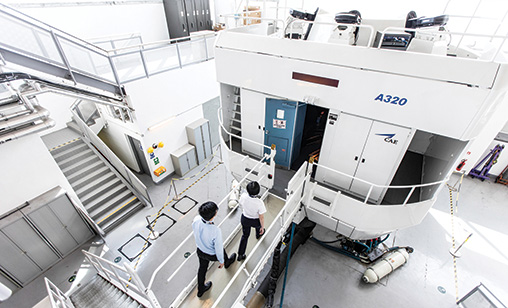Training
Vietnam and China attract joint venture training partners
Vietnam is one of the fastest growing aviation markets in the region. Efforts to ensure a steady supply of pilots for its airline fleets include setting up foreign joint venture academies.
September 1st 2019
Bamboo Airlines, launched in January this year, may be one of Vietnam’s newest airlines, but with 10 A320s in service and 77 more aircraft on order, including 30 787-9s, it has moved quickly to ensure it has the cockpit crew to fly its fleet. Read More »
In late July, it announced construction had started on an aviation academy in the central province of Binh Dinh that is scheduled to begin operations in 2022. Its goal is to train 3,500 students annually, including pilots, flight attendants, maintenance engineers and other aviation specialists.
 |
And Bamboo is not alone. At the same time, BAA Training Vietnam, a European aviation training joint venture, announced the completion of its training centre in Ho Chi Minh City. The 3,000 square metre campus will accommodate four full flight simulators for A320 training.
Also on the drawing board is a facility planned by yet-to-fly newcomer, Vinpearl Air, which is owned by Vietnamese conglomerate, Vingroup. It has its AOC and aims to fly 30 aircraft to domestic and international destinations.
Vinpearl has signed a co-operation agreement with Canada’s CAE Oxford Aviation Academy to train pilots, flight technicians and other personnel and provide high-tech resources for Vietnam and the world. Under the agreement, the VinAviation School and Vinpearl Air Training Centre will be established in Vietnam.
Once Vinpearl takes to the air, the country will have six airlines: Vietnam Airlines, Jetstar Pacific, Vietjet Air, Bamboo Airways, Vasco and Vinpearl Air. The country’s transport ministry has targeted average annual growth for the aviation sector of 16% to 2020 and 8% for the next decade.
Bamboo’s academy, costing $30 million, will be located in the Nhơn Hội Economic Zone in Quy Nhơn City. It is the first of several training facilities that will include academies in Quảng Ninh, Hải Phòng and Vĩnh Phúc.
At the Quy Nhon City ground-breaking ceremony, Bamboo signed deals with the New Zealand Aviation Academy to train pilots to meet international standards and also contracted with the University of Engineering and Technology, under the Việt Nam National University, to improve the quality of crew training and to conduct joint scientific research.
Bamboo Air’s permanent vice chairman, Đặng Tất Thắng, said the academy would work with universities in Việtnam and overseas to boost aviation training standards and connect with the world’s OEMs to train skilled aviation workers.
| 'The growing diversity and mobility of aviation personnel will require instructors to have cross-cultural, cross generational and multi-lingual skills to engage with tomorrow’s workforce. Effective training and an adequate supply of personnel will remain critical to maintaining the health and safety of the entire aviation ecosystem' |
| Boeing pilot and technician global forecast 2019-2038 |
BAA Training Vietnam said its A320ceo full flight simulator (FFS) is being assembled. The first A320 type rating pilot cadet intake began training last month.
“The Vietnamese aviation market has been growing by an average 8% per year and is expected to continue its growth in the next 20 years,” said BAA CEO, Egle Vaitkeviciute, “Airlines in Vietnam keep announcing fleet expansion plans. The national carrier alone has recently revealed it would acquire 50 new narrow-body aircraft including the A320.
“With our modern training facilities and equipment, experience and deep know-how we are ready to accommodate Vietnamese pilots with European standard aviation training solutions.”
In China, Avia Solutions and Henan Civil Aviation Development and Investment Company have established a joint venture, BAA Training China. Based in Zhengzhou Airport Economic Zone, adjacent to Zhengzhou Xinzheng International Airport, it is intended to become a crew training academy of choice for Mainland carriers.
The $60 million BAA Training China centre, which will operate under a franchise licence, will have six full flight simulators from the A320 and 737 families. The first simulator is scheduled to be ready for training in the second half of next year.
BAA Training China aims to train 4,000 pilots a year, provide up to 40,000 simulator hours annually for new and current cockpit crew and offer 30,000 hours in theoretical courses in each 12 months.
Boeing’s global pilot and technician outlook forecasts Asia-Pacific demand for 244,000 new pilots, 249,000 technicians and 323,000 cabin crew in the next two decades. Demand will be driven by a mix of fleet growth, retirements and attrition, Boeing said.
Future solutions to ensure sufficient crews to operate the region’s expanding fleet are immersive technologies, adaptive learning, schedule flexibility and new teaching methods to meet a wide range of teaching styles, Boeing said.